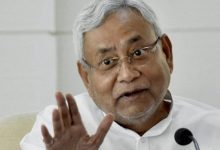Rahul Gandhi managed to show his prowess and oratorial skills but failed to use this as a chance to show he has emerged as a better leader than before. Through his wink and the hug, he may become an MTV ‘Youth Icon of the Year’ but he fails to show in any way he has the wisdom to lead a nation where majority of the population languishes in penury, disease and low standard of living, opines our Associate Editor, exclusively for Different Truths.
Imagine having an Indian Prime Minister who winks? Media played up the moment captured when Rahul Gandhi, after his speech, went onto hug the PM on his seat, and after coming back to his seat, winks. Kudos to the shutterbugs for showing us the ‘real intention’ of the hug-neeti. Rahul Gandhi epitomises an ‘Opposition’ leader who is immature, shoddy and one who couldn’t get out of his ‘toyland’. Mama Mia! After all, how long will it take somebody to understand that the debate over the ‘no-confidence motion’ tabled by the Telugu Desam Party was one being closely watched by national and international leaders? All eyes were on us – Indians. Does Gandhi’s gesture befit a prime ministerial candidate as is expected in 2019? Does Gandhi, then, truly represent a figure that befits the stature of a good Opposition leader? It maybe doubted. He only seemed to show a casual attitude towards such an important occasion. It does send one thinking whether Indian politics and its standards have lowered since the past debates of Atalji and the times of Indiraji; or does Gandhi represent a generation that has grown up watching MTV and ‘crass media’ which propels this Gandhi scion to take up an act straight out of theatrics?
No-confidence motion is usually an opportunity for politicians to prove their mettle and bring out the real issues that the country is grappling with – unemployment, basic infrastructural needs, basic daily needs of the poor, rampant casteism, crimes against women to name a few. It is an opportunity to inform the government where it fails and has misgoverned and where it can improve. Notwithstanding the political invective, Gandhi did ‘attack’ the government on several counts which seemed more like personal ‘vendetta with Modi government’ (set out to settle personal scores with false accusations on the Defence Minister Nirmala Sitharaman over Rafale deal for which the clarification came immediately both from the Ministry of Defence and the French government) rather than forcing the government to think why the electorate maybe unhappy. Through his ‘personal attacks’, Gandhi managed to show his prowess and oratorial skills but failed to use this as a chance to show he has emerged as a better leader than before. Through his wink and the hug, he may become an MTV ‘Youth Icon of the Year’ but he fails to show in any way he has the wisdom to lead a nation where majority of the population languishes in penury, disease and low standard of living.
Indian media either has no news or decides to play up the Gandhi stunts in public or simply have been habituated to look upto Mr. Gandhi for providing ‘sensational footage’. Instead of highlighting the real debate that went on Lok Sabha Television where each speaker, one after another, spelt out the huge sums of money that were meant to be ascertained for development but were never released by the government (as mentioned by Jayadev Galla of Telugu Desam Party representing Guntur constituency of Andhra Pradesh), Indian private channels simply replayed Gandhi’s hug-tactic and went on to discuss how Rahul Gandhi may or may not have improved as a politician; this goes on to indicate that Gandhi has become ‘an item’ for the media to follow for his funny acts and distract the audience from the main issue at hand instead of being a mainstream politician. The media could have had discussions on why TDP had moved the motion in the first place to which Modi only replied ‘NDA ki sarkaar Andhra ki janata ke kalyaan ke kaam mein koi peechhey nahin rahegi’ (the NDA government will leave no stone unturned for the development of the state of Andhra Pradesh). After Rahul Gandhi, several other leaders went on to make their case in support of the motion but none of them were discussed on broadcast media. If one watched the debate carefully, the main highlight of it was that 2019 election could be a contest of BJP versus coalition politics. Leaders from various UPA partners- AIADMK, TMC, SP, CPI-M and the like were seething with resentment and crying out how BJP has not lived on quite a few of its promises made in 2014. The question is- is the government really listening or will continue to embark on its yojanas as a political gimmick.
Compare this to the 23-hour floor test faced by Atalji-led NDA government in 2003 or the no-trust debate that Narasimha Rao’s government had to face thrice in July 1992, in December 1992 and in 1993. These lasted for 14, 21 and 19 hours respectively. Prior to this, Indira Gandhi faced the no-trust motion 15 times and Jawaharlal Nehru faced it once in 1963. One still misses Atalji’s speech in parliament in 1996 when the House resonated to the his emotional words of ‘Hum apne desh ki sewa ke karya mein doobey rahengey, hum sankhya-bal ke saamney sir jhukaatey hain aur aapko vishwaas dilaatey hain jo karya humney haath mein liya hai, wo apna rashtriya uddeshya jab tak poora nahin kar lengey, tab tak vishraam se nahin baithengey’ (we will remain immersed in our work for the nation, today we may have to bow down before the Congress numbers, but we assure you we will not rest until we have completed the task and achieved our objective of nationalism); following which he submitted his resignation. That was the last time India saw an ‘intellectual debate’.
The recent no-confidence motion was only an opportunity for the current government to re-spell its policies and programmes before the parliament and the public. The issue put forth by Reddy, the parliamentarian who initiated the debate, remained where it was. Rahul Baba remained as much a reason to jest over as he has been in the past. Things remained unchanged as the nation watched the trust vote which the government won hands down. The questions remain unanswered: has the trust vote not wasted time of the Indian parliament where they could have discussed other issues and voted over some major changes proposed by the government? Have media debates and their standards not fallen? Has ‘celebrity journalism’ taken over key debates in the field of politics, too? Has the quality of debate in Indian parliament been compromised? Has ‘nationalism’ and ‘trust’ been relegated to a mere transactional process between the parliamentarians and the electorate? We need to think beyond ‘freebie politics’ to be able to emerge as a strong nation leading the world. Rahul Gandhi and the like must be dismissed as ‘wasting our time and his’ instead of being covered largely across broadcast media.
©Navodita Pande
Photos from the Internet





 By
By
 By
By
